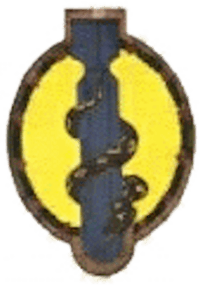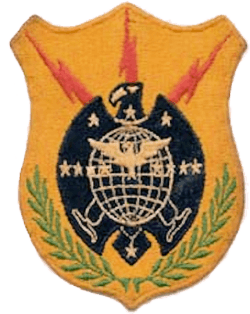381st Bombardment Squadron
| 381st Bombardment Squadron | |
|---|---|
|
Emblem of the 381st Bombardment Squadron | |
| Active | 1942-1945; 1947-1949; 1952-1965 |
| Country | United States |
| Branch | United States Air Force |
| Type | Bombardment |

The 381st Bombardment Squadron is an inactive United States Air Force unit. It was last assigned to the 310th Bombardment Wing, stationed at Shilling Air Force Base in Kansas.
It was inactivated on 25 March 1965.
History
Activated in mid-1942 as a B-25 Mitchell medium bomber squadron, it was trained by the Third Air Force in the southeastern United States. The squadron deployed initially to England in September 1942 and flew some missions under the VIII Bomber Command over German-occupied France, attacking enemy troop formations, bridges and airfields. It was part of the Operation Torch invasion of North Africa in November 1942, being deployed to the new Mediterranean Theater of Operations (MTO), and was assigned to the Twelfth Air Force in French Morocco in November. In North Africa, the squadron engaged primarily in support and interdictory operations, bombing marshalling yards, rail lines, highways, bridges, viaducts, troop concentrations, gun emplacements, shipping, harbors and other targets in North Africa.
The squadron also engaged in psychological warfare missions, dropping propaganda leaflets behind enemy lines. It took part in the Allied operations against Axis forces in North Africa during March–May 1943 and the reduction of Pantelleria and Lampedusain islands during June. Squadron personnel were also involved in the invasion of Sicily in July, the landing at Salerno on the Italian mainland in September, the Allied advance toward Rome during January–June 1944, the invasion of Southern France in August 1944 and the Allied operations in northern Italy from September 1944 to April 1945.
It was inactivated in Italy after the German capitulation in September 1945.
The squadron was reactivated as part of the Air Force Reserve in 1947, it is unclear whether or not the squadron was manned or equipped. It was inactivated later that year.
It was reactivated in 1952 as a Strategic Air Command squadron, receiving B-29 Superfortress bombardment training from the 90th Bombardment Wing, between April and August 1952. The squadron acted as a training unit until 1954 when it replaced the propeller-driven B-29s with new B-47E Stratojet swept-wing medium bombers. These aircraft were capable of flying at high subsonic speeds and were primarily designed for penetrating the airspace of the Soviet Union. By the early 1960s, the B-47s were considered to be reaching obsolescence, and were being phased out of SAC's strategic arsenal. They were sent to AMARC at Davis-Monthan in early 1965; this unit was inactivated in March.
Lineage
- Constituted 381st Bombardment Squadron (Medium) on 28 Jan 1942
- Activated on 15 Mar 1942
- Inactivated on 12 Sep 1945
- Redesignated 381st Bombardment Squadron (Light) on 11 Mar 1947
- Activated in the reserve on 9 Aug 1947
- Inactivated on 27 Jun 1949
- Redesignated 381st Bombardment Squadron (Medium) on 15 Mar 1952
- Activated on 28 Mar 1952
- Inactivated on 25 March 1965
Assignments
- 310th Bombardment Group, 15 Mar 1942-12 Sep 1945; 9 Aug 1947-27 Jun 1949
- 310th Bombardment (later Strategic Aerospace) Wing, 28 Mar 1952-25 Mar 1965
Stations
|
|
Aircraft
- B-25 Mitchell, 1942-1945
- B-29 Superfortress, 1952-1954
- B-47 Stratojet, 1954-1965
References
![]() This article incorporates public domain material from the Air Force Historical Research Agency website http://www.afhra.af.mil/.
This article incorporates public domain material from the Air Force Historical Research Agency website http://www.afhra.af.mil/.
- Maurer, Maurer, ed. (1982) [1969]. Combat Squadrons of the Air Force, World War II (PDF) (reprint ed.). Washington, DC: Office of Air Force History. ISBN 0-405-12194-6. LCCN 70605402. OCLC 72556.

